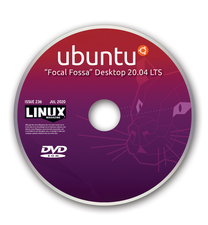On the DVD
On the DVD

Ubuntu 20.04 Desktop and Fedora 32
Ubuntu 20.04 [1] "Focal Fossa" is a Long Term Support (LTS) release. LTS releases happen every two years, for the benefit of businesses that do not care to update every six months, as well as any users who value stability. Until 2025, Ubuntu 20.04 will receive updates, security fixes, and support. Enterprise clients can also receive an additional five years Extended Security Maintenance (ESM) releases.
As an LTS release, Ubuntu 20.04 does not introduce many new features. Instead, its emphasis is on stability, which means that some new features are not obvious to users. Existing Ubuntu users may notice a dark version of the default theme – and the inclusion of Gnome 3.36, which includes improved font support and fixes to Gnome Web, Gnome's web browser. Another new feature is Linux Kernel 5.4, which includes Linux kernel lockdown, a component that improves security by restricting access to the kernel.
Ubuntu 20.04 also includes two controversial choices. First, you won't find the Amazon Web app. This feature, which allows direct access to Amazon from the desktop, has been controversial for years, inspiring complaints about lack of privacy and security and even generating a rebuke from Free Software Foundation founder Richard Stallman. Ubuntu did not give any reason for the removal, but a likely reason is that the controversy has simply not gone away over time.
[...]
Buy this article as PDF
(incl. VAT)
Buy Linux Magazine
Subscribe to our Linux Newsletters
Find Linux and Open Source Jobs
Subscribe to our ADMIN Newsletters
Support Our Work
Linux Magazine content is made possible with support from readers like you. Please consider contributing when you’ve found an article to be beneficial.

News
-
Introducing matrixOS, an Immutable Gentoo-Based Linux Distro
It was only a matter of time before a developer decided one of the most challenging Linux distributions needed to be immutable.
-
Chaos Comes to KDE in KaOS
KaOS devs are making a major change to the distribution, and it all comes down to one system.
-
New Linux Botnet Discovered
The SSHStalker botnet uses IRC C2 to control systems via legacy Linux kernel exploits.
-
The Next Linux Kernel Turns 7.0
Linus Torvalds has announced that after Linux kernel 6.19, we'll finally reach the 7.0 iteration stage.
-
Linux From Scratch Drops SysVinit Support
LFS will no longer support SysVinit.
-
LibreOffice 26.2 Now Available
With new features, improvements, and bug fixes, LibreOffice 26.2 delivers a modern, polished office suite without compromise.
-
Linux Kernel Project Releases Project Continuity Document
What happens to Linux when there's no Linus? It's a question many of us have asked over the years, and it seems it's also on the minds of the Linux kernel project.
-
Mecha Systems Introduces Linux Handheld
Mecha Systems has revealed its Mecha Comet, a new handheld computer powered by – you guessed it – Linux.
-
MX Linux 25.1 Features Dual Init System ISO
The latest release of MX Linux caters to lovers of two different init systems and even offers instructions on how to transition.
-
Photoshop on Linux?
A developer has patched Wine so that it'll run specific versions of Photoshop that depend on Adobe Creative Cloud.
